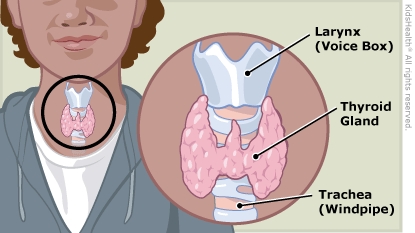- Parents Home
- Para Padres
- A to Z Dictionary
- Allergy Center
- Asthma
- Cancer
- Diabetes
- Diseases & Conditions
- Doctors & Hospitals
- Emotions & Behavior
- First Aid & Safety
- Flu (Influenza)
- Food Allergies
- General Health
- Growth & Development
- Heart Health & Conditions
- Homework Help Center
- Infections
- Newborn Care
- Nutrition & Fitness
- Play & Learn
- Pregnancy Center
- Preventing Premature Birth
- Q&A
- School & Family Life
- Sports Medicine
- Teens Home
- Para Adolescentes
- Asthma
- Be Your Best Self
- Body & Skin Care
- Cancer
- Diabetes
- Diseases & Conditions
- Drugs & Alcohol
- Flu (Influenza)
- Homework Help
- Infections
- Managing Your Weight
- Medical Care 101
- Mental Health
- Nutrition & Fitness
- Q&A
- Safety & First Aid
- School, Jobs, & Friends
- Sexual Health
- Sports Medicine
- Stress & Coping
What Is the Thyroid?
What Is the Thyroid?
The thyroid (say: THYE-royd) is a gland, which is an organ that makes special chemicals called hormones (say: HOR-moans).
The thyroid is shaped like a little butterfly or bow tie and it sits under the skin in the front of your neck. To find it, touch your throat in the Adam's apple area with one finger and the top of your breastbone (the flat bone that runs down the middle of your chest) with another finger. The thyroid is in that small space in between your fingers. It bobs up and down when you swallow. See if you can feel it!

What Hormones Does the Thyroid Make?
The two major hormones that the thyroid makes and releases into the bloodstream are called:
- T4 or thyroxine (say: thy-ROKS-in)
- T3 or triiodothyronine (say: try-eye-o-doe-THYE-row-neen)
All cells in the body need thyroid hormones to work properly. These hormones control how fast the body uses up energy and are key factors in helping kids grow.
What Problems Can Happen?
The thyroid works kind of like the thermostat in a house. When the thyroid makes the right amount of thyroid hormones, it keeps the temperature just right. But:
- If the thyroid is too active (overactive) and makes too much T4 and T3, it's like having a thermostat that's set too high, so the house gets overheated. This is called hyperthyroidism (say: hi-per-THYE-roy-diz-em).
- If it's not active enough (underactive), it's set too low and the house is too cold. This is hypothyroidism (say: hi-po-THYE-roy-diz-em).
When a kid has one of these thyroid problems, doctors can treat it with medicine or, sometimes, surgery.

© 1995- The Nemours Foundation. KidsHealth® is a registered trademark of The Nemours Foundation. All rights reserved.
Images sourced by The Nemours Foundation and Getty Images.
Humana Healthy Horizons in Ohio
- Humana Healthy Horizons
- Humana Healthy Horizons Extras
- Member Support
- Care management
- Caregiver resources
- Child well-being
- Disease management
- Documents and forms
- Enrollment
- Grievances and appeals
- Health and wellness
- KidsHealth
- Member Handbook
- New Member Resources
- News and alerts
- OhioRISE Plan
- Pregnancy outcomes
- Tobacco cessation
- Why Humana
- Your primary care provider
- For Providers
- Contact us
- Accessibility
- Humana Healthy Horizons
- Humana Healthy Horizons Extras
- Member Support
- Care management
- Caregiver resources
- Child well-being
- Disease management
- Documents and forms
- Enrollment
- Grievances and appeals
- Health and wellness
- KidsHealth
- Member Handbook
- New Member Resources
- News and alerts
- OhioRISE Plan
- Pregnancy outcomes
- Tobacco cessation
- Why Humana
- Your primary care provider
- For Providers
- Contact us
- Accessibility